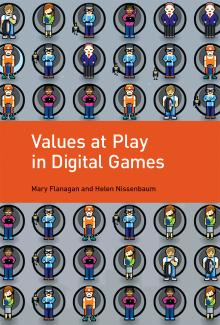Mary Flanagan – Group 2
Mary Flanagan’s Presentation on Games, Design and Values
Ava Hill
Caroline O’Connor
Amanda Ortiz
Lauren Gary
“It is this fruitful tension between concrete and the abstract with which I play to create my work.”
– Mary Flanagan
 Mary Flanagan is an extraordinary example of entrepreneurship in digital media. Her prominent voice in the world of technology is continuing to break boundaries by investigating technology, specifically games and human dynamics, while focusing on values at play. Some of her work includes “Critical Play: Radical Game Design,” a self-created
Mary Flanagan is an extraordinary example of entrepreneurship in digital media. Her prominent voice in the world of technology is continuing to break boundaries by investigating technology, specifically games and human dynamics, while focusing on values at play. Some of her work includes “Critical Play: Radical Game Design,” a self-created game research lab, Tiltfactor, and her new book, Values at Play in Digital Games, co-authored by Helen Nissenbaum. As she studies the relationships between behavior, tools, play and daily life, Flanagan shines a necessary light on how we can strive to make and use technology more positively. She continues to influence designers and consumers by investigating how the world can be changed through values at play.
game research lab, Tiltfactor, and her new book, Values at Play in Digital Games, co-authored by Helen Nissenbaum. As she studies the relationships between behavior, tools, play and daily life, Flanagan shines a necessary light on how we can strive to make and use technology more positively. She continues to influence designers and consumers by investigating how the world can be changed through values at play.
As a guest speaker for the Understanding Media Studies seminar, she discussed video games, the possible effects they can have on consumers, and most importantly, overcoming the challenge of creating innovative methods to promote positive values through game play. Flanagan shared her perspective on the gaming industry, its impact on young adults, how deeply values are embedded in games, and her attempts to start the conversation with designers about the importance of being more conscientious in creating game content. Flanagan shared her wealth of knowledge about this unique industry, while discussing her profound understanding of video games and the major role they play in today’s increasingly technological world.
 In 2014, international video game revenue is estimated to be $81.5B. The sheer number of people who purchase and engage with video games compels us to raise questions regarding their potential social effects, such as how game-playing informs family dynamics, how it impacts us psychologically, physiologically and emotionally. But what about younger teen players whose brains are still forming, who are still striving to make sense of the world, their own personal boundaries and their relationships with others? In her lecture, Flanagan noted that despite the expansive and growing nature of the video game industry, the games themselves have yet to become a discipline in their own right in the way Film Studies or Literature Studies have over time, leaving a lot of unanswered questions about the significance of their content. Flanagan maintains that video games do have significant positive effects on young adults; studies have shown that playing them can improve certain cognitive abilities, hand-eye coordination, as well as decision-making and abstract thinking.
In 2014, international video game revenue is estimated to be $81.5B. The sheer number of people who purchase and engage with video games compels us to raise questions regarding their potential social effects, such as how game-playing informs family dynamics, how it impacts us psychologically, physiologically and emotionally. But what about younger teen players whose brains are still forming, who are still striving to make sense of the world, their own personal boundaries and their relationships with others? In her lecture, Flanagan noted that despite the expansive and growing nature of the video game industry, the games themselves have yet to become a discipline in their own right in the way Film Studies or Literature Studies have over time, leaving a lot of unanswered questions about the significance of their content. Flanagan maintains that video games do have significant positive effects on young adults; studies have shown that playing them can improve certain cognitive abilities, hand-eye coordination, as well as decision-making and abstract thinking.
F or better or for worse, games are in the hands of today’s youth; ninety-seven percent of people under the age of eighteen play video games on a regular basis. For this reason, Flanagan believes it is essential to discover ways in which to harness their power for good. Games like Grand Theft Auto, which often encourages violence, for example, by giving players the option to kill prostitutes for financial gain, can reinforce or introduce negative societal structures to young minds. Treatment of women in mature games can be particularly problematic. In video games like Tomb Raider, Soul Calibur, and Tekken women are frequently objectified and portrayed as sex objects in a way that rarely reflects the real life experiences of the player. This is not necessarily because the designers are misogynistic or trying to degrade women—in fact, many women work on designing the games. However, just as in other entertainment industries including film, TV and publishing, sex sells. In contrast to the capitalist view of success as a financial measurement, Flanagan believes that a game only succeeds if the values embedded within it promote a positive lifestyle, not one defined by violence, degradation of women, vulgar language, social corruption, or environmental destruction.
or better or for worse, games are in the hands of today’s youth; ninety-seven percent of people under the age of eighteen play video games on a regular basis. For this reason, Flanagan believes it is essential to discover ways in which to harness their power for good. Games like Grand Theft Auto, which often encourages violence, for example, by giving players the option to kill prostitutes for financial gain, can reinforce or introduce negative societal structures to young minds. Treatment of women in mature games can be particularly problematic. In video games like Tomb Raider, Soul Calibur, and Tekken women are frequently objectified and portrayed as sex objects in a way that rarely reflects the real life experiences of the player. This is not necessarily because the designers are misogynistic or trying to degrade women—in fact, many women work on designing the games. However, just as in other entertainment industries including film, TV and publishing, sex sells. In contrast to the capitalist view of success as a financial measurement, Flanagan believes that a game only succeeds if the values embedded within it promote a positive lifestyle, not one defined by violence, degradation of women, vulgar language, social corruption, or environmental destruction.
Although games containing such mature content are restricted for kids, they inevitably trickle down to a younger demographic, especially when their content is often specifically designed to appeal to young adults. Dark play and violent games have always been a part of childhood, no matter the medium. Flanagan maintains that despite the multi-sensory experience video games offer, kids playing a pretend war game with toy guns in the backyard is an equally immersive experience, and notably, an entirely natural one. It is the disordered values, rather than the violence itself, that Flanagan finds concerning. As one of the first scholars in the field of video games, Mary Flanagan has not only been examining video games as they are today, but what they have the potential to become. The power games have to captivate their audience cannot be undervalued. If the future of our world is in the hands of the children of today, it makes it all the more essential to identify the values that are either intentionally or unintentionally embedded in current video games, and strive to create more meaningful games for tomorrow.
 Flanagan’s challenge is to change the world through values at play — but has this goal been achieved? Through her work, she hopes to inspire others to become conscientious designers. The largest obstacle in her path is initiating conversations with these designers in order to work on reorienting the values that are currently most dominant in the gaming community. Flanagan revealed much of her insight on games that are promoting positive values in the industry; for example, she mentioned, Papers, Please, a game that highlights the realities and frustrations of immigration. Set in the fictional communist nation, Arstotzka, the game simulates border crossing and challenges the player to choose who can or cannot enter the country. Papers, Please, among other games of its nature, gives gaming a new platform by doing more than just promoting violence and bad behavior, and instead producing experiences relative to the everyday challenges of the real world. Through intelligent and forward-thinking design, new dynamic virtual worlds can be created to immerse a player in the action, while still being educational and enforcing positive values.
Flanagan’s challenge is to change the world through values at play — but has this goal been achieved? Through her work, she hopes to inspire others to become conscientious designers. The largest obstacle in her path is initiating conversations with these designers in order to work on reorienting the values that are currently most dominant in the gaming community. Flanagan revealed much of her insight on games that are promoting positive values in the industry; for example, she mentioned, Papers, Please, a game that highlights the realities and frustrations of immigration. Set in the fictional communist nation, Arstotzka, the game simulates border crossing and challenges the player to choose who can or cannot enter the country. Papers, Please, among other games of its nature, gives gaming a new platform by doing more than just promoting violence and bad behavior, and instead producing experiences relative to the everyday challenges of the real world. Through intelligent and forward-thinking design, new dynamic virtual worlds can be created to immerse a player in the action, while still being educational and enforcing positive values.
 Flanagan also stressed the importance and power of values expressed through not only the games themselves, but their creators. Games similar to Papers, Please are changing the way we see values at play, but are still not making a large statement in the mainstream game-design world. Flanagan explained the valuation of games being most influential in terms of power and how they often reflect the values of their stakeholders. This causes a huge disparity between widely popular, more explicit games, and those that carry less weight in popularity, but more in education and constructive values. Ideally, once society begins to more critically consider what values games embody, consumers will be inspired to consider more carefully how these values are represented in the games they choose to purchase – and those values could become more widely representative of the game-design industry.
Flanagan also stressed the importance and power of values expressed through not only the games themselves, but their creators. Games similar to Papers, Please are changing the way we see values at play, but are still not making a large statement in the mainstream game-design world. Flanagan explained the valuation of games being most influential in terms of power and how they often reflect the values of their stakeholders. This causes a huge disparity between widely popular, more explicit games, and those that carry less weight in popularity, but more in education and constructive values. Ideally, once society begins to more critically consider what values games embody, consumers will be inspired to consider more carefully how these values are represented in the games they choose to purchase – and those values could become more widely representative of the game-design industry.
In addition to starting a conversation about values at play, Flanagan also faces the challenge of spreading awareness to help popularize these ideas. She mentioned the “cultural fear” that makes many designers afraid to talk about what values need to be promoted through the games they create. Flanagan stressed how it is often difficult for designers to challenge questionable moral and ethical choices, especially when certain games are making millions of dollars by sticking to established conventions. She also explained the inevitable challenges designers face in making games — giving the example of having to compose an effective way to create an educational game for HPV victims in Mozambique. In this instance, gaming was used as a tool to help players overcome certain cultural fears, and Flanagan urges designers to be more bold with their choices and find ways to break through boundaries and create amazing games. The rating is still pending on Flanagan’s success in changing how we view values at play. However, an important conversation has started — only time will tell how many voices will join in and hopefully change the world for the better.
- Mary Flanagan – Changing the World Through Values at Play - September 15, 2014
- Caitlin Burns – Lessons from the Story Business - October 6, 2014
- Mary Flanagan – Group 1 - October 7, 2014